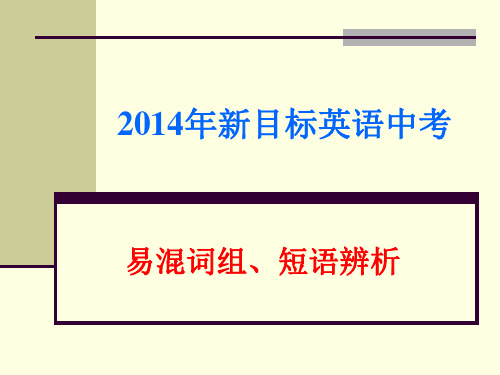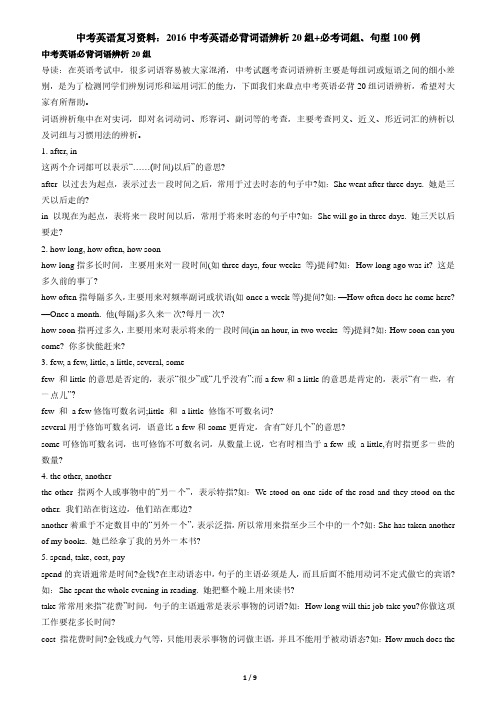中考英语易混词汇辨析
- 格式:doc
- 大小:476.38 KB
- 文档页数:19

2018年中考易混词汇辨析:fine, nice,good, well2018年中考易混词汇辨析:good, well中考英语备考中有很多词汇需要大家掌握,在备考过程中大家要学会归纳和总结易混词汇,这样才能掌握更多的词汇,下面xx网为大家带来2018年中考易混词汇辨析【good, well】这篇内容,希望大家能够认真阅读。
四者都可用作形容词表示"好"之意,但前三者既可作表语又可作定语,而后者仅用作表语。
主要区别在于: (1) fine指物时表示的是质量上的"精细",形容人时表示的是"身体健康",也可以用来指"天气晴朗"。
例如:Your parents are v你父母身体很健康。
That's a fine machine.那是一台很好的机器It's a fine day for a walk today.今天是散步的好时候。
(2)nice主要侧重于人或物的外表,有"美好","漂亮"的意思,也可用于问候或赞扬别人。
例如:Lucy l露西看上去很漂亮。
These coats are v那些裙子很好看。
Nu. 见到你很高兴。
It's vu. 你真好。
(3)good形容人时指"品德好",形容物时指"质量好",是表示人或物各方面都好的普通用语。
例如:Ha good student. 她儿子是一个好学生。
The red car is very good. 那辆红色小汽车很好。
(4)well只可用来形容人的"身体好",但不能作定语,它也能用作副词作状语,多放在所修饰的动词之后。
例如:I'm very well, thanks. 我身体很好,谢谢。
ds sing well. 我的朋友们歌唱得好。
2018年中考易混词汇辨析【good, well】这篇内容是xx为大家带来的,希望大家在备考中考英语的时候能够牢固掌握这些内容,这样大家的中考英语水平就能得以提高。



1. aloud 只⽤作副词,不⽤作形容词,可表⽰:
(1) 强调“出声”,即把话说 出来,⽽不是在⼼⾥默默地“说”,常与动词read, speak, think 等动词连⽤。
如:read aloud (朗读);think aloud (⾃⾔⾃语地说)。
(2) 表⽰“⼤声”,通常与动词cry, laugh, shout等连⽤,如:cry alooud (⼤声哭),shout aloud(⼤声喊)。
2. loud表⽰“⼤声”或“响亮”,可⽤作形容词和副词:
(1) ⽤作形容词。
如:He has a loud voice. 他嗓⼦⼤。
(2) ⽤作副词(与loudly 同义),⼀般只与动词speak, talk, laugh等连⽤,且必须放在这些动词之后。
如:
I can’t hear you, please speak louder. 我听不见,请说⼤声些。
3. loudly 只⽤作副词(与⽤作副词的loud 同义)。
如:
Don’t talk so loudly (或loud). 别这么⼤声讲话。
注:(1) loudly ⽐loud (adv. ) 的应⽤范围更⼴,它除与speak, talk, laugh等动词连⽤外,还可与其它表⽰声响的动词连⽤,且呆以放在这些动词之前或之后。
如:snore loudly (鼾声打得响)。
(2) 在⽤于⽐较级或级时,通常⽤loud,⽽不⽤loudly。
如:
Who laughed loudest? 谁笑的声⾳?。

2020上海中考备考易错/易混词一、拼写易错in depend ent (depend) 独立的,不依赖的,有主见的invit a tion (invite)邀请,请帖deci sion (decide)决定conclu sion(conclude)结论discuss ion(discuss)讨论organiz ation(organize)组织,团体,机构compe tition(compete)竞赛,比赛solu tion(solve)解决方法;解答refer ence n. 参考experi ence n. 经验;经历confer ence n. (正式的)会议;讨论会confid ence n. 自信心;信任differ ence n. 不同entr ance(v. enter)入口dist ance n. 距离appear ance n. 出现,外面perform ance n. 表演,演出;行动import ance n. 重要性possib ility可能性responsib ility 责任succ ee d(v.)-succ e ss(n.)--succ e ssful(adj.)-succ e ssfully(adv.) true(adj.)-tru th(n.)-tru ly(adv.)sch e d u le 时间表计划表emb a rr a ss 使窘迫,使尴尬emb arra ssed adj. 局促不安的;为难的;尴尬的amus e ment (amuse v.)娱乐argument (argue v.)争辩、争吵wisd o m(wise a.)智慧a tt itude 态度lu gg age n. 行李offic ia l n. 官员adj. 官方的,政府的;官员的physic al adj. 身体的;物理的law yer 律师fish er man渔夫beg gar 乞丐language 语言op i n io n n. 看法,观点partn er n. 搭档,合作者Wednesday 星期三Thursday 星期四August 八月September 九月nurse ry 托儿所leng th(long) 长度wei gh t(weigh) 重量respons ible(responsib ility) 负责任的possib ly(possible) 可能地av e r a ge adj. 平均的;普通的n. 平均数adv a nt a ge n. 有利条件;优势;优点nine-nin e ty-ninth-ninet ie thfour-fourth-forty-fort ie thfive-f if th-fifty-fift ie thin correct不正确的;错误的un correct ed未改正的im possible不可能的im polite 没有礼貌的dis honest 不诚实的vary--vari ou s--var ie ty--var ie ti es易错动词形式plan--pla nn ed--pla nn ingprefer--prefe rr ed--prefe rr edpay--pa id--pa id--pay ingbegin--beg a n--beg u n--beggi nn ingwrite--wr o te--wri ttenfly--fl ew--fl own--fly inggrow--gr ew--gr ownteach--t au ght--t au ghtcatch--c au ght--c au ghtbring--br ou ght--br ou ghtbuy--b ou ght--b ou ghtthink--th ou ght--th ou ghthear--hear d--hear d二、形近异意everyday a. 每天的=dailyevery day (词组)每天=per day h a bit n. 习惯h o bby n. 爱好,嗜好d ai ly ['deɪli] 每日的d iar y ['daɪəri] 日记d air y ['deəri]乳制品invent ion(发明)invent or(发明家)art[ɑːt] -artist 艺术act[ækt]行为,行动activity 活动(outdoor activities)active 积极的、活跃的(take an active part in) action 行动(take action to do sth. )act ress女演员act or男演员compete [kəmˈpiːt]v. 竞争complete [kəmˈpliːt] v./adj.完成,完全的coll ege n.大学vill age n.村庄popular adj.流行的,通俗的;受欢迎的;大众的population [pɒpjuˈleɪʃn]人口pollution(pollute)[pəˈluːʃn]污染difficult--difficulty 困难的、困难different--difference 不同的、差异test [test] 测试、测验text [tekst] 课文、文本pri ze n. 奖赏,奖品pri ce n. 价格protest抗议;反对protest againstprotect 保护,防护[不使受到……的损害或侵犯] protect from/against fire /sun/cold/hurtprevent 阻止, 挡住prevent sb. from doing=stop/keep sb. from doingfall-f e ll-fall en落下;倒下;来临feel-f e lt-f e lt感觉;觉得;触摸;摸起来hang—hang ed—hang ed吊死,上吊hang --h u ng—h u ng 悬挂find—found—found 发现,找到found—found ed—found ed建立,创立;创办lie—lied—lied—lying 说谎lie—lay—lain—lying 躺,位于lay—laid—laid—laying 放置,摆放except [ɪk'sept] prep. 除了expect [ɪk'spekt] v. 期望hardly adv. 几乎不hard adv. 努力地;猛烈地adj. 硬的;困难的;艰难的quiet ['kwaɪət] a.安静的quite [kwaɪt] ad. 相当;完全;十分;很forget ful健忘的(un)forget table(难)容易忘的;不会忘记的w ea ther n. 天气w he ther conj. 是否三、固定搭配(词组类)be fond of 喜爱be keen on 热衷于make fun of sb.取笑某人,作弄...,嘲弄...play a trick on sb.捉弄某人be harmful to=do harm to=be bad for 对......有害be useful to 对......有用be satisfied/pleased withbe surprised at sth.be angry with sb. 对某人生气be angry at sth. 对某事生气be strict with sb. 对某人严格要求be strict in sth. 对某事情严格要求sb. be familiar with sth. 某人熟悉某事sb./sth. be familiar to sb. 某人(事)为某人熟悉provide sb. with sth. 为某人提供某物provide sth. for sb.offer sb. sth=offer sth. to sb. 主动提出;自愿给予be thankful to sb. for (doing)sth. 因某事感谢某人be popular with/among sb. 受到某人的喜爱get into the habit of(doing) 养成做某事的习惯play a trick on sb. 捉弄某人on one’s side 支持某人,站在某人一边of one’s own=belong to sb.on one’s own=by oneselfused to do sth.过去常常做be/get used to (doing)sth.习惯做be used to do=be used for doing被用来做what……do withhow……deal withwhat to dohow to do itbe famous for( its silk)以(它的丝绸)……而闻名be famous as(a writer…)以……作为(一名作家)而闻名sb. pay $5 for sth.sb. buy/purchase sth. for $5 sb. spend $5 on/(in)buying sth. sth. cost sb. $5。

中考英语复习资料:2016中考英语必背词语辨析20组+必考词组、句型100例中考英语必背词语辨析20组导读:在英语考试中,很多词语容易被大家混淆,中考试题考查词语辨析主要是每组词或短语之间的细小差别,是为了检测同学们辨别词形和运用词汇的能力,下面我们来盘点中考英语必背20组词语辨析,希望对大家有所帮助。
词语辨析集中在对实词,即对名词动词、形容词、副词等的考查,主要考查同义、近义、形近词汇的辨析以及词组与习惯用法的辨析。
1. after, in这两个介词都可以表示“……(时间)以后”的意思?after 以过去为起点,表示过去一段时间之后,常用于过去时态的句子中?如:She went after three days. 她是三天以后走的?in 以现在为起点,表将来一段时间以后,常用于将来时态的句子中?如:She will go in three days. 她三天以后要走?2. how long, how often, how soonhow long指多长时间,主要用来对一段时间(如three days, four weeks 等)提问?如:How long ago was it? 这是多久前的事了?how often指每隔多久,主要用来对频率副词或状语(如once a week等)提问?如:—How often does he come here? —Once a month. 他(每隔)多久来一次?每月一次?how soon指再过多久,主要用来对表示将来的一段时间(in an hour, in two weeks 等)提问?如:How soon can you come? 你多快能赶来?3. few, a few, little, a little, several, somefew 和little的意思是否定的,表示“很少”或“几乎没有”;而a few和a little的意思是肯定的,表示“有一些,有一点儿”?few 和a few修饰可数名词;little 和a little 修饰不可数名词?several用于修饰可数名词,语意比a few和some更肯定,含有“好几个”的意思?some可修饰可数名词,也可修饰不可数名词,从数量上说,它有时相当于a few 或a little,有时指更多一些的数量?4. the other, anotherthe other 指两个人或事物中的“另一个”,表示特指?如:We stood on one side of the road and they stood on the other. 我们站在街这边,他们站在那边?another着重于不定数目中的“另外一个”,表示泛指,所以常用来指至少三个中的一个?如:She has taken another of my books. 她已经拿了我的另外一本书?5. spend, take, cost, payspend的宾语通常是时间?金钱?在主动语态中,句子的主语必须是人,而且后面不能用动词不定式做它的宾语?如:She spent the whole evening in reading. 她把整个晚上用来读书?take常常用来指“花费”时间,句子的主语通常是表示事物的词语?如:How long will this job take you?你做这项工作要花多长时间?cost 指花费时间?金钱或力气等,只能用表示事物的词做主语,并且不能用于被动语态?如:How much does thejacket cost?这件夹克多少钱?pay 主要指主语(某人)买某物(或为某事)付多少钱(给某人)?如:I pay for my rooms by month. 我按月支付租金?6. speak, say, talk, tell这四个动词都有“说”的意思?speak的意思是“讲话;演讲”,着重指说话的动作,指开口说或连续不断地说,多用作不及物动词;用作及物动词时,其宾语是语言名称?如:He can speak Japanese. 他会说日语?say的意思是“说;讲”,一般用作及物动词,着重指说话的内容?它的宾语可以是名词?代词或直接引语等?如:She says, “Don’t draw on the wall!”她说:“别在墙上画画!”talk的意思是“说;讲;谈话”,与speak意义比较接近,但不如speak正式,着重强调两人之间的相互谈话,也可指单方面的谈话?如:She is talking with John in English。
中考初中英语易混易错词汇总结第一部分:易用错的词1. clothes, cloth, clothingclothes统指各种衣服,谓语动词永远是复数,cloth指布,为不可数名词clothing服装的总称,指一件衣服用a piece of, an article of2. amount, numberamount后接不可数名词,number后接可数名词a number of students3. family, house, homehome家,包括住处和家人,house房子,住宅,family家庭成员. My family is a happy one.4. sound, voice, noisesound自然界各种各样的声音,voice人的嗓音,noise噪音I hate the loud noise outside.5. photo, picture, drawingphoto用照相机拍摄的照片,picture可指相片,图片,电影片,drawing画的画Let's go and see a good picture.6. vocabulary, wordvocabulary词汇,一个人拥有的单词量,word具体的单词He has a large vocabulary.7. population, peoplepopulation人口,人数,people具体的人China has a large population.8. road, street, path, wayroad具体的公路,马路,street街道,path小路,小径,way道路,途径take this road; in the street, show me the way to the museum.9. course, subjectcourse课程(可包括多门科目),subject科目(具体的学科)a summer course10. custom, habitcustom传统风俗,习俗,也可指生活习惯,后接to do,habit生活习惯,习惯成自然,后接of doing. I've got the habit of drinking a lot.11. cause, reasoncause指造成某一事实或现象的直接原因,后接of sth./doing sth,reason用来解释某种现象或结果的理由,后接for sth./doing sth. the reason for being late12. exercise, exercises, practiceexercise运动,锻炼(不可数),exercises练习(可数),practice(反复做的)练习Practice makes perfect.13. class, lesson作"课"解时,两者可以替换.指课文用lesson.指班级或全体学生用class. lesson 6; class 5 14. speech, talk, lecturespeech指在公共场所所做的经过准备的较正式的演说,talk日常生活中的一般的谈话,讲话,lecture学术性的演讲,讲课 a series of lecture on…15. officer, officialofficer部队的军官,official政府官员an army officer16. work, job二者均指工作。
初中英语易混词考点解析之accident,incident,event表“事件”的区别初中英语易混词考点解析之accident,incident,event表“事件”的区别在平时的英语学习中,同学们要善于把一些相似易混的单词放在一起对比记忆,这样才能更清楚的划分它们之间的区别。
英语的学习需要不断的总结积累,是一个循序渐进的过程,平时就要把学过的知识点做一个整理归纳,并且经常拿出来翻看,日积月累中才能真正提高成绩。
初中英语易混词考点解析之accident,incident,event学生初中英语相关问题安老师您好,我是一名初二的学生,想向您咨询一个问题,今天我们课上学了accident这个词,老师说是“事件,事故的”意思,我记得很清楚,结果这个月的月考就正好考到这个词,我选择了accident,可是竟然错了,正确答案是event,老师说这个词也是“事件”的意思,适合用在这个语境中,我表示很苦恼,为什么刚学过的知识点一考试就变样了呢,平时的初中英语学习中,也总是碰到这样类似的问题,总以为自已会,一到考试就丢分,请问这类易混单词到底应该怎么背啊,学过的这样的知识点太多了,都混在一起了,请老师帮忙梳理一下?多谢。
安颖老师答疑安颖老师:您好,我把这个单词给您做一个梳理。
单词accident是“事件”的意思,实际上在学习中同学们还遇到过其他可以表示“事件”意思的词,比如incident, event ,但是它们之间是有一些细微区别的,考试中也容易针对这些区别设空,让同学们去选择。
这就需要我们在平时的学习中就要注意总结归纳,整理一些易混词。
今天我们要讲到的accident,incident,event这三组词都有“事件”的意思,但在考试当中针对这些词的考察主要集中在他们表示“事件”时的一些区别,尤其是在完形填空中,最容易针对这些意义相似易混的词进行考察,很多同学分不清。
accident n. 事故,意外事件traffic accident 交通事故by accident 偶然的辨析 accident incident eventaccident 一般指一些意外事故incident 一般指小事件,小事故event 一般指大的事件,活动或大型运动项目She was involved in a serious car accident last week.上星期她卷入了一场严重的车祸。
中考英语词汇辨析1.spend,pay,cost,takesb. spend +时间/金钱 on sth. 某人在…上花费时间/金钱e.g. I spend two hours on English every day. 我每天花两小时学英语。
sb. spend +时间/金钱 (in) doing sth. 某人花费时间/金钱做某事e.g. Tom spends 5 dollar updating his computer system. Tom花五美元更新他的电脑系统。
sb. pay + 金钱 for…某人在...上花费金钱e.g. I paid 100 yuan for the shirt. 我花100元买这件T恤。
sth. cost sb. + 金钱/时间…花了某人的金钱/时间(cost的用法中,花金钱的出现频率比花时间高)e.g. It costs him ten euros. 它花了他十欧元。
It takes/took sb. +时间/金钱 to do sth. 花了某人时间/金钱做某事It takes me 6 minutes to take a shower. 冲澡花了我6分钟。
… take sb. +时间/金钱. …花了某人时间/金钱。
注意:spend和pay主语通常是人,而cost和take主语通常是物。
2.“at,on,in + 时间”at, on, in+时间,均可表示"在……的时候"。
at + 具体的时间点I get up at six o'clock in the morning . 我早晨六点起床。
Breakfast would be finished at seven.早餐将在七点结束。
on+具体某一天或具体某一个早上(下午、晚上)on Monday 在星期一on Sunday morning 在星期天早上(特指)on July 1st 在七月1日on a cold night in 1938 在1938年的一个寒冷的晚上in+具体某一年(季、月),早上,下午,晚上in 2020 在2020年in September 在九月in the morning 在早上(泛指)in the evening 在晚上可见at后跟的时间更精准,on次之,in排在最后。
初中英语高频考点词汇mean词义辨析
mean这个词是一个很活用的词汇。
意思广泛,词性变换大,更是中考常考知识点,所以要引起大家注意。
mean (meant, meant)
v. 用意;意味着;意欲;引起
adj. 吝啬的;刻薄的;低劣的;凶狠的
n. 平均值;中庸
meaning adj. 意味深长的
meaningful 有意义的;意味深长的
meaningless 无意义的;无目的的
meaning n. 意义;含义;意图
meanness 卑鄙;吝啬;劣等
尤其要注意就是meaning既有名词意思又有形容词意思。
然后别的形容词的其他形式及搭配使用都要引起重视。
短语:
in the mean 当其时;同时;在此期间
mean time n. 平均时间(平均太阳时)
in the mean time 同时
mean value 平均值,平均数
mean by 意思是…
what do you mean
你的意思是什么
例句
Does anyone want to join this meaningful event (活动)?。